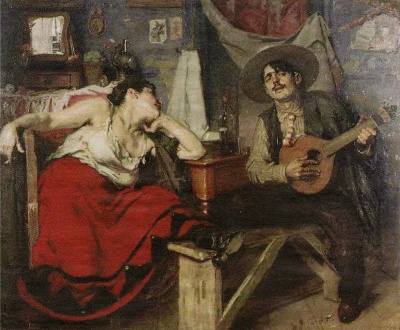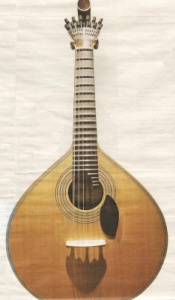
Painting by José Malhoa, 1910 - Source: Wikipedia
Elevated to World Intangible Heritage by UNESCO, Fado confirms its universality and its ties to the world. But how does the world feel and live the Fado? These are some of the answers found to this question.
Fado music, one of the strongest symbols of our culture was declared a World Intangible Cultural Heritage by UNESCO. Of no avail in trying to claim its origins: World Music has incorporated it in its inventory long ago, independently of local attributes. Since 2005 this appropriation of Fado throughout the world has led to an application for World Heritage by means of a scientific committee led by the musicologist Rui Vieira Nery, of which made part the ethnomusicologist Salwa Castelo-Branco and Sara Pereira, director of the Fado Museum, among others. Six years later in Bali, Indonesia, the initiative was unanimously given official reconnaissance by a panel of 24 countries, therefore becoming heritage of humanity.
But what humanity are we talking about? How is this soundscape so deeply Portuguese and Lisboeta perceived by whom doesn’t share a common geography? How is Fado viewed and lived from abroad, in other latitudes and longitudes? The Chinese Yao Junming, professor of the Department of Portuguese of the University of Macau – besides being a poet and translator of authors like Eugénio de Andrade and Fernando Pessoa – has an answer to that: “Fado speaks much of the history of Portugal, reflecting good and bad moments and expresses well what goes deep in the hearts of the Portuguese”. Fluent in Portuguese, the professor gives special attention to the lyrics, although with the perception of sadness that sometimes arises. “Sadness is one of the most noble feelings in any person”, he says. Also in China, Paulo Valentim, player of the Portuguese guitarra (a pear-shaped cittern with twelve wire strings, unique to Portugal) and a composer, is teaching Portuguese and Chinese students how to play the instrument under a project supported by the Casa de Portugal in Macau. “For them to understand the guitar and Fado is a unifying element, a greater connection with our culture”, the musician comments, enhancing the interest that still arises in a territory where the ties with Portugal have maintained for over four centuries. Surely that to appreciate Fado, it will not suffice to make part of the collection of countries that have Portuguese influence. Brazil exemplifies one of these cases. José Ramos Tinhorão, researcher of folk music, confirms that throughout the twentieth century, Amalia’s Fado arrived in the country by means of radio “in programs that were aimed at the Portuguese community in Rio de Janeiro, when it had some relevance” – something that today no longer happens. “Nowadays there is no diversity in the musical production in the Brazilian market. The music that you listen to is Brazilian, English and American. Fado is absent, in the same way that French or Italian music are not found, nor Tango from the neighboring Argentina”, explains the historian.
On the other side of the Atlantic, the ties are found further North, in the U.S., where the Portuguese community identifies Fado as a strong connecting factor. “There is an important correlation between Fado and the immigrant community, that tie the lyrics and the music with what makes them feel “saudade” (a deep nostalgic longing) of their homeland and of the adventure that brought them there”, refers Kimberly Da Costa-Holton, professor of Portuguese Studies in the University of Rutgers, in Newark, New Jersey. The sons of immigrants hear this music at home and in the cafes, and some even adventure to say that “Fado has more significance to them than to the Portuguese that live at home”. The musicologist that researched Fado since 1933, points out its revival among the new generation: today’s young generation, completely bilingual, based in New Jersey and New York, are totally American but embrace the Fado culture. The phenomenon has some five years. She doesn’t have a clear explanation for it.

Courtesy of Jornal Expresso
In France, the relationship with Fado is not only claimed by the Portuguese community, but also by a growing number of French that in June of 2011, went in droves to the auditorium of the Théâtre de la Ville, in downtown Paris, to watch a night of Fado organized in the period of candidacy of Intangible Cultural Heritage of Humanity. Emmanuel Demarcy-Mota, the director of the Theater (with a capacity of 1000 people), said that the room quickly filled and the reception of the public was extraordinary. For the French director, son of the Portuguese actress Teresa Motta, Fado represents an opportunity for fellow countrymen to enter in another culture and impregnate themselves with the identity of another population: French people don’t like Fado because it is exotic but because they identify it with Portugal. Fado is Portugal, it is the closest that you can get to “saudade”, a word for which there is no specific translation.
“Fado is characterized as a sound image that is immediately identifiable and corresponds to a romanticized idea that Spaniards have of Portugal”, states Teresa Cascudo, Spanish musicologist with two decades of connection to our country. For her Fado seduces for its elegance, for being restrained and harmonious and for having an aristocratic essence. The professor of the University of La Rioja and faculty member of the INET (Institute of Ethnomusicology) of the University Nova de Lisboa, the Spaniards enter in sync with the Fado language thanks to their familiarity with another poetic form that they know well: the Copla (Spanish Music and poetry).
Fado is appreciated In Spain although not excessively. Miguel Mora, a journalist specialized in the relation between this music genre and Flamenco, says that they have a very close relationship for having a shared history. Fado today has such a global development that it starts to resemble Flamenco’s international diffusion. To Miguel Mora, Fado has vitality, mystery, poetry, elegance and even some wisdom and love added into it. It has such a melodic simplicity and now it belongs to all, there is no coming back.
*Article by Luciana Leiderfab in collaboration with Ángel Luís de La Calle, Gilberto Lopes, Maria da Paz Trefaut and Ricardo Lourenço. Article was originally published in the Atual magazine supplement (pages 21/22) of the Expresso, dated December 3, 2011 and translated under permission by BestInPortugal. Image credits: Jornal Expresso and Wikipedia.
Books on Fado (through Amazon.com) **:
**Disclaimer: I receive a small commission from the sale of these books, but the price is exactly the same as if you went to purchase it directly in the Amazon site.

{ 2 comments… read them below or add one }
The genre of Fado music must be soothing
http://www.ecocta.com
It surely is and its merit was finally recognized internationally.
{ 1 trackback }